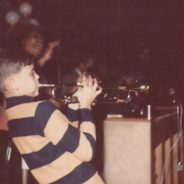Snapshots of Dementia: A Step in the Wrong Direction
Photo by Ahmed Zayan on Unsplash Where could he be? Traffic was extra heavy the night of our Sunday school Christmas party in 2016, and although I left work as soon as I could, I still arrived at the home of our pastor and his wife about 15 minutes late. But where was Tom? He had volunteered to bring one of our more senior class members with him, so he would have left from the church and picked her up on his way. Neither of us liked to be late, so since I couldn’t control what time I finished work, I figured he would arrive first. Not prone to worry, I busied myself helping set up the huge array of food for our potluck meal (remember those?). Still, I kept my phone handy. We waited, and waited, and after some other late arrivals, we finally started the meal without our two stragglers. I didn’t want to bug Tom if he were stuck in traffic. So I kept looking at my phone, holding off on my own meal until he arrived. Surely he’ll show up in just a few more minutes. More than an hour after the party began, I got my phone call. As I anticipated, Tom sounded upset. “I don’t even know what’s going on,” he told me. “It’s like I can’t get there from here. We’re coming, though.” “How long do you think you’ll be?” “I have no idea.” And just like that, he ended the call. In another 20 minutes, I had another call, this time more frantic. “Tell me the address,” he said. The address? Why does he need the address? Wouldn’t he have already entered it in his phone? And besides, he’s been here multiple times. What on earth is going on? Finally, nearly two hours after the party started, Tom pulled up with our friend after what should have been at most, even in holiday traffic, a 30- or 45- minute drive. Always gracious, she joined the happy group, chattering away about the traffic and ever-present construction. But Tom remained silent. Angry? Embarrassed? I couldn’t tell. All I knew was that no, he didn’t want to eat. No, he didn’t want to play games. And yes, he was extremely upset. For a few minutes, I thought we might need to make a quick exit. I had rarely seen him in such a state. He sat across from me at the table. But once he realized the party was well underway and no one seemed to pay much attention to his tardiness, he relaxed. We finished the evening well and enjoyed the fellowship with dear friends. Still, I was thankful when another man volunteered to take Tom’s passenger home in the church van. I had no idea if Tom could get her back to her condo, and I knew neither of them needed the added stress. What I also knew was that this represented a huge change. A limousine driver during our seminary years, Tom had always been one of those people who could get to anywhere from anywhere. Even when we moved to a new city, he learned his way around right away. As for me? I knew GPS was God’s mercy on my direction-impaired life. After this Christmas-party incident, I noticed his...
read moreSnapshots of Dementia: Hard to Swallow
Photo by Max van den Oetelaar on Unsplash Cough. Splutter. Choke. Spit. Repeat. If you lived at our house or followed us on our morning walks, this is what you would hear almost every day. Sometimes a little, sometimes a lot. And if you stayed with us, you might hear these sounds periodically throughout the day as well. Any regular readers will have noticed that I’ve shared some dementia symptoms that surprised me. This one definitely did—for at least two reasons. First, I couldn’t find a doctor who paid attention when I mentioned it. And second, it appeared a few years ago, right around the time I first began wondering if Tom had some sort of problem. No list of initial dementia symptoms I saw at the time mentioned this. Because Tom has chronic asthma, diagnosed in childhood, when he first started struggling with this choking problem upon awakening, I thought his asthma was getting worse. When we walked our dog in the morning, he would often cough and spit multiple times in only a few minutes. I tried not to say it, but I would think what you may well be thinking right now: Gross! But I was also concerned. I urged him to tell his PCP. I tried to get him to see a pulmonologist (respiratory specialist). When he didn’t comply, I kept reminding him. When we visited the first neurologist, I didn’t mention this coughing/choking/spitting problem because I thought we were looking at Tom’s mind and memory. I had no idea they were connected. Two years later, after our life had changed drastically and I knew I needed to get some medical answers, I mentioned this issue to three different neurologists. Not one seemed concerned. The most one staff member said was, “We’ll deal with that later.” But still and again, I knew something wasn’t right. So many of you have commented about how well I’ve done and how strong I’ve been. Please know that what I’m trying to do is to show you how not well I’ve done and how many things I missed along the way. I hope that, by sharing my mistakes, I’ll help prevent you from making the same ones. I deserve no hero badges. And God gets all the credit for the ways I’ve learned and grown. Again, every dementia is different, and every patient is different. I don’t know why this issue, which I now know is called dysphagia, showed up so long before Tom’s diagnosis. But earlier this year, when we had our first visit with his PCP here in South Carolina, I brought up the coughing/choking/spitting one more time because it seemed worse. The doctor looked at me. “Let me see about that.” Grabbing a tongue depressor, she headed over to Tom, who was seated on the examining table. “Open wide.” It took all of 30 seconds for her to discover what no one else had thought to check. “No wonder he’s choking. He’s lost his gag reflex, probably some time ago. When you and I sleep at night, we automatically swallow any drainage we produce. His brain doesn’t tell him he needs to do that, so he wakes up choking and spitting.” This time, I was the one having trouble swallowing. No gag reflex? Why didn’t anyone...
read moreSnapshots of Dementia: Tangled
“They told me they would take care of it,” Tom told me the other day. “Who? Who would take care of what?” It took at least three or four more questions for me to pull enough from him to know what he meant. He had called our pest-control company to see if they could return to our home to take care of a problem. Because he often rambles or talks in circles now, I try to listen in on calls like this when he insists on making them. This time, he had gone to the other end of the house. But what he did in this brief conversation is something that’s happened many times in the past few years. I call it “beginning in the middle.” He starts partway through what most people would consider a normal train of thought. It’s as though he assumes I know what he is thinking before he says it. And through the grace of God, sometimes I’ve learned to do just that. A few months before we moved, I was at work, and Tom sent me an email that “began in the middle” and thus made little sense. But God, the revealer of mysteries, helped me interpret what he meant and give the answer he needed. Tom didn’t think anything unusual had happened. But by this time, I did. Of course, before I knew he had frontotemporal degeneration (FTD), I couldn’t figure out why these communication mixups kept happening. And although I suspected something was wrong, I didn’t see how these strange episodes fit into a pattern of anything. Except they did. I don’t ever see the term “tangled” on a list of dementia characteristics, but that’s how I picture his thoughts. So often, they seem hopelessly tangled, the way a ball of yarn looks after a kitten gets hold of it. Sometimes a piece breaks free, and we can follow it for a long while. Other times, one tangle only leads to the next. I believe this “tangled” problem relates to the loss of executive function I mentioned in my previous post. It’s one of the reasons I believe Tom can no longer hold down a job. The more his symptoms increased, the more tangled his thoughts and behaviors became. And it seems almost everything he touched (bill paying, taxes, work, and more) became tangled as well. Back when he still handled our finances, he never wanted to set our mortgage in Florida up on automatic payments; he preferred to pay the bill himself every month. But for at least two years, I often found him scrambling to pay it at 11 o’clock p.m. the day it was due, then running into a problem with the website (in his tangled brain, it was always the website and never him). The next day, he would call and (because he still had his extroverted charm) talk his way out of a late fee. And yet—I didn’t question him. I honestly believed for a long time that the website went down or was not user-friendly or any one of a number of reasons he honestly thought were the truth. Even today, when he struggles to navigate his favorite online golf game, in his tangled mind, the app is the problem—not his dementia. While this lack...
read moreSnapshots of Dementia: The Day the Music Died
Tom playing his first trumpet gig, c. 1969 We refuse to let this thief steal our faith, our marriage or our family, but he has already taken Tom’s ability to work, drive and play his trumpet. The above words come from my November 2019 Facebook post, the first time I shared publicly about Tom’s struggles with early-onset dementia. If you’ve read my recent blog posts, you understand why I referred to dementia as a thief. But how could it steal his trumpet playing? Isn’t that something he could do in his sleep? One would think so. Trumpet playing has been such a part of Tom’s identity that most longtime friends don’t think of him apart from his trumpet. He began playing in third grade at age 9. By sixth grade, he played his first nightclub job. And by junior high, he was one of three students marching with the high school band. Tom still has a T-shirt imprinted with “Band Nerd,” and no description seems more accurate. All-city, all-state; you name it, and he did it. The kid who used to listen to Herb Alpert albums a few notes at a time, write down what he heard and then play the songs didn’t even realize he had perfect pitch until a college professor identified it. But his favorite expressions of music always involved worship. Years ago, I remember a dear woman of God saying Tom had a special anointing when he played for worship that was far greater than his natural ability. I fully believe this statement. Over and over, I saw his playing touch people’s hearts in powerful ways. Tom playing his trumpet on a mission trip to Mexico, c. 2002 In May 2016, before we ever saw a neurologist, Tom was one of three lead trumpet players for a special recorded concert of the Florida Worship Choir & Orchestra. He had a busy few weeks before the concert and apparently didn’t practice enough. When the evening ended, he knew he had injured his lip. He iced it during the concert and on the way home. “I can’t play,” he said. “I’ll have to let it heal.” And so he did. For weeks. As part of his sixtieth birthday celebration, I gave him a summer trip to a trumpet camp run by one of his longtime trumpet heroes: Malcolm McNab, who played lead trumpet on thousands of movies and television shows. For Tom, this was the gift of a lifetime. But should he go with his injured lip? He called to cancel, but Mr. McNab graciously convinced him to come. And Tom was so thankful he did. Not only did he get to spend time with his college music professor, Wiff Rudd (now head of the brass department at Baylor University), but he soaked in so much music that week. He came home excited about the recovery plan McNab had given him, telling me he could call them with questions at any time. Except he didn’t. He would practice, but rarely. He managed to play “Taps” at a funeral that fall, but a few months later, a dear friend passed away. Tom had promised to play for his service, but he now told the family he couldn’t. And it seemed I felt more regret than he did. As...
read moreSnapshots of Dementia: Who Are You, and What Have You Done With My Husband?
I know You’re able and I know You can/ Save through the fire with Your mighty hand/ But even if you don’t/ My hope is You alone. I sang along with MercyMe as I drove to work, my voice quavering as the tears streamed down my face. Why did I even bother putting on makeup? It’s a good thing I have a long drive. Lord, give me the strength I need. This scene repeated itself in my car almost every morning during the late spring, summer and fall of 2017. But why? Hadn’t the neurologist reassured us only a few weeks before? Yes, by the doctor’s standards, Tom was fine. But more and more cracks showed up in his life. As the days went on, some of these revealed themselves as fault lines. As they widened, the elements around them threatened to collapse. Our communication. Tom’s job. Our finances. Our marriage. I love my husband and want to honor him. I pray that nothing I share makes anyone think less of this loving, creative man created in the image of God. But I also feel compelled to warn people of the potential effects of a disease I believe comes from the pit of hell. Strong words. But words from the heart of a woman whose husband of more than 30 years went from caring and committed, leading others to walk in faith, to falling prey to various online scams, often with a sexual connection, and showing decreasing interest in both his family and spiritual things. One day, he called me at lunch. “Someone is blackmailing me through Facebook.” “What? What do you mean, blackmailing you?” “They’re threatening me. If I don’t pay them, they’ll post on my wall.” “What are you talking about? Who cares if they post about you? No one will believe it anyway! Of course you shouldn’t pay!” But he continued in an increasingly frantic tone, telling me about connecting with someone he said was a woman and that if he did not comply, “she” would post a video he would never want anyone to see. I took a deep breath. “You’re on your own. Do whatever you want.” And for one of the few times in my life, I hung up on my husband. Through my shock, I realized Tom had a serious problem. But I had long believed God would make up for any perceived lack in my life. I could trust Him. Hence the MercyMe song. The tears. The prayers. Tom did pay the money, and he said the police told him nothing could be done. But this action and others that followed moved me to do something that helped me survive my heartbreak: I insisted we begin marriage counseling. I knew he needed help. And that meant we needed help. I contacted my friend Dr. Ted Roberts and Pure Desire Ministries. God had given me a connection with them through my writing work several years before, and I trusted their biblical and clinical emphasis. I wasn’t even thinking of dementia at this point; all I knew was that Tom was broken, and I wanted to see him healed. Our many months of counseling helped me in multiple ways. But for the most part, Tom seemed disinterested. Unless I helped him with...
read more







